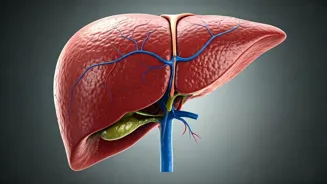Protein-Rich Meals
Kicking off the list is a crucial dietary change: incorporating good-quality protein into every meal. This isn't just about eating more; it’s about making
protein a consistent part of your diet. Protein requires more energy to digest compared to carbs or fats, which helps boost your metabolism. Foods like lean meats, poultry, fish, eggs, and plant-based proteins such as beans and lentils should be regular staples. This habit helps to increase the thermic effect of food, meaning your body uses more energy just breaking down what you eat. Consider planning your meals to ensure you’re hitting this mark consistently, which can lead to improvements in your metabolism.
Prioritize Hydration
Staying hydrated is a foundational element, and the surgeon highlights its significance. Water plays a vital role in numerous bodily functions, including metabolic processes. Dehydration can slow down your metabolism, making it less efficient. Aim to drink plenty of water throughout the day. You can also incorporate hydrating foods like fruits and vegetables. Proper hydration assists in burning calories and helps the body function optimally. Monitoring your water intake and ensuring you are consistently hydrated is a simple yet effective habit for boosting your metabolism and overall well-being.
Importance of Breakfast
The surgeon stresses the critical role of breakfast in kickstarting your metabolism. Eating a nutritious breakfast after your overnight fast jumpstarts your metabolism for the day. It helps regulate blood sugar levels and prevent overeating later. Skipping breakfast can lead to your body slowing down its metabolic rate to conserve energy. A balanced breakfast including protein, healthy fats, and complex carbohydrates provides sustained energy and supports metabolic functions throughout the morning. Consider options like eggs with whole-grain toast, oatmeal with nuts, or a protein smoothie. This practice sets a positive tone for your metabolism, which can lead to greater energy expenditure and improved overall health.
Weight Training Benefits
Weight training is not just about building muscles; it's also a powerful tool for boosting your metabolism. When you lift weights, you build muscle mass. Muscle tissue is more metabolically active than fat tissue, meaning it burns more calories even when you're at rest. Regular weight training increases your body's resting metabolic rate, making your body a more efficient calorie-burning machine. Aim to incorporate weight training sessions into your weekly routine. This habit helps increase your muscle mass and thereby boosts your body's overall ability to burn calories. A consistent strength training regimen will result in a noticeably improved metabolism.
HIIT to Raise BMR
High-Intensity Interval Training (HIIT) is another effective strategy for increasing your body's Basal Metabolic Rate (BMR). HIIT involves short bursts of intense exercise followed by brief recovery periods. This type of training is incredibly effective for improving metabolic function. It boosts your metabolism during and after your workout. HIIT workouts can be incorporated into various forms of exercise like running, cycling, or bodyweight exercises. HIIT workouts can also improve your body's ability to burn fat. By regularly integrating HIIT sessions into your fitness regime, you can significantly boost your metabolism and optimize your overall calorie-burning capacity.
Prioritize Sleep Quality
The surgeon rightly underscores the importance of good sleep for metabolic health. During sleep, your body performs essential repair and restoration functions, including regulating hormones that affect metabolism. Lack of quality sleep can disrupt these processes, slowing down your metabolism and increasing your risk of weight gain. Aim for 7-9 hours of quality sleep per night. Create a relaxing bedtime routine, ensure a dark, quiet, and cool sleep environment, and avoid screen time before bed. Prioritizing sleep is not only good for your overall health but also supports a healthy metabolism.
Spice Up Meals
Adding spice to your meals can have a positive impact on your metabolism. Certain spices, such as chili peppers (which contain capsaicin), have been linked to an increased metabolic rate. These spices can temporarily boost your body's ability to burn calories. Incorporating spices into your meals is an easy, tasty, and effective way to support a healthy metabolism. Experiment with different spices to discover the flavors you enjoy while benefiting your metabolism. By incorporating this habit, you can subtly increase your metabolism.
Manage Your Stress
Managing stress is crucial for metabolic health, according to the surgeon. Chronic stress can trigger the release of cortisol, a hormone that can interfere with metabolism. Elevated cortisol levels may lead to increased appetite, fat storage, and a slower metabolism. Implement stress-reducing techniques such as meditation, deep breathing exercises, or spending time in nature. Identify the sources of stress in your life and take steps to manage them effectively. Practicing stress management is essential for metabolic health and overall well-being. Regular stress management can lead to a more efficient metabolism.
Green Tea, Coffee
The inclusion of green tea or coffee in your daily routine can be metabolically beneficial. Both green tea and coffee contain compounds that can stimulate your metabolism. Green tea contains catechins, which can help burn fat, while coffee contains caffeine, which can boost your metabolic rate. The consumption of green tea or coffee can provide an added metabolic advantage. However, it's essential to consume these beverages in moderation and be mindful of any potential side effects like anxiety or sleep disturbances. This habit may support a more efficient metabolism, but it is only one piece of a holistic approach.
Daily Body Movements
Even small, everyday movements can have a cumulative impact on your metabolism. The surgeon suggests incorporating more movement into your daily life. This includes taking the stairs instead of the elevator, walking during your lunch break, or standing up and moving around periodically throughout the day. These small changes increase non-exercise activity thermogenesis (NEAT), which contributes to overall calorie expenditure. By consciously increasing your movement, you can make a positive impact on your metabolic health. Making small changes like these consistently can subtly but effectively boost your metabolism, which in turn contributes to better overall health.













![[WATCH] 'Real Madrid, Ramadan and rest' - Mohammed Siraj how last-minute World Cup call-up changed February plan](https://g-mob.glance-cdn.com/public/fc/image/ByYT_LEmlrD0.webp)


